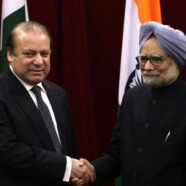Optimism Ahead of India-Pakistan Trade Talks
Pakistan’s new government under Prime Minister Nawaz Sharif said it believes efforts to improve trade links with India can eventually become a major “confidence-building” step toward normalizing bilateral relations.
Pakistan and India have made considerable progress in the last three years on normalizing trade ties, including signing several agreements to facilitate cross-border business contacts to increase annual bilateral trade, which currently stands at around 2.6 billion dollars.
However, military tensions and ensuing skirmishes along the disputed Kashmir border during most of the previous year stalled the trade liberalization process.
The tensions have now subsided following a long-awaited meeting in December between top military commanders of the two countries, where they agreed to ensure peace on borders and respect a mutual cease-fire in Kashmir.
All eyes are now set on Saturday’s meeting in New Delhi between Indian and Pakistani commerce ministers. The two sides are expected to refocus fresh proposals to speed up the trade liberalization process.
Ahead of his talks with the Indian counterpart Anand Sharma, Pakistani trade minister Khurrum Dastgir Khan called for both sides to prevent mutual suspicion and distrust from denying both nations’ people the opportunity to economically grow and prosper.
“We should have a relationship which is not dependent upon news of the day. We should have a relationship as neighbors, which is uninterrupted and uninterruptable. So, yes, there will be tensions there will be certain issues on both sides. But should that completely derail a relationship and we seal off the two people from each other and not benefit from each other’s economies?” asked Khan.
Islamabad has long linked restoration of full trade ties with New Delhi to progress in a decade-old wide-ranging peace dialogue which is aimed at settling bilateral disputes, including the Kashmir conflict.
India insists that wider cooperation in areas such as trade and the economy should not wait for political differences to be settled.
Minister Khan said he hopes increased trade links could clear the way for progress on political issues dividing the two countries.
“It has been a disappointment, let me just say, [that] in all these years of composite dialogue since 2004 that no substantial progress has been made by both countries [on political issues]… Ultimately the political side has to come in parallel to [how rapidly we move on the trade side], otherwise trade will reach a certain level and then stop. Because to go beyond that level will require investment and investment will not happen unless investors [in both countries] have certain confidence that these are two countries not going to go to war,” said Khan.
The minister urged India to ease visa restrictions for businessmen to facilitate frequent travel and allow them to assess investment opportunities in each other’s countries. He criticized the strict visa regime as the “greatest non-tariff trade barrier.”
Khan said that while some sectors in Pakistan, including agriculture, fear opening up trade with India could undermine their business, many others will hugely benefit from it.
“We believe that opening up trade with India, however gradual it might eventually turn out to be, will be a huge boon for Pakistan in terms of industrial growth, in terms of job creation,” said Khan.
Since taking charge in June, Prime Minister Sharif’s government is said to have decided to “de-link” the issue of trade relations with India from the progress on the slow-moving peace dialogue.
While officials have yet to confirm it, the reported shift in Pakistan’s traditional stand on normalizing ties with India, some say, could be the outcome of enormous challenges facing the new government as it tries to revive national economy.

